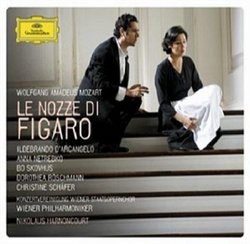OK singing, awful conducting.
Barone Scarpia | Mexico City | 08/13/2007
(3 out of 5 stars)
"This version is one of those recordings that two kind of people buy: snobs and "Nozze di Figaro" hardcore fans.
Unfortunately the fans will be heavily disappointed. The singing is good, but sometimes the fiato of the singers is mediocre. Also the pronunciation (specially of the supporting characters) is very poor. I do not like Skhovus as the Count, sometimes he tries too hard to be funny and sometimes he is too harsh. Netrebko's Susanna is too dark and very little passion comes from her. D'Arcangelo Figaro can't match others such as Prey's or Terfel's.
The conducting... OH, MY! Harnoncourt reading of the score is quite uneven. Sometimes he's too slow (like in the Overture that must me thundering) and sometimes he's thundering (when Susanna comes out from the Countess' closet the music should be mellow and Harnoncourt feels that he's conducting the 1812 Overture).
Buy it only if you're a fan of Netrebko. It's perhaps the only time she'll sing "Le Nozze". Instead of this version, try Böhm's or Karajan's. I never thought that DG would release such a bad product. Stay away from this "Nozze", for real.
By the way, don't pay attention to the three stars I give to this awful product. It deserves one and a half, at most."
Figaro Meets Psycho
Magyar | The Universe | 05/31/2008
(5 out of 5 stars)
"This is not your grandma's Figaro. At first I was surprised, then taken aback, then intrigued and then completely mesmerized. It's Figaro meets Psycho. The pacing is slower, more deliberate and the whole tone and atmosphere darker and more intense. And in the end, I think it works.
The whole theme of this production is the maddening, almost destructive power of Eros (here portrayed by an extraneous character- a seductive non -speaking/singing young man dressed in school boy uniform with cherubic wings running around trying to manipulate all the characters) locked in a battle with "Love." In the end "Love" triumphs. (except for poor Cherubino who throughout the opera is portrayed as a poor young thing totally defenseless against the power of Eros--in the end he's reduced to a zombie).
The singing and the technical quality, I thought, was first rate (It's a very recent production so it utilizes the latest in live sound recording..not like some of the older productions where the sound drifts when the singer moves in and out of microphone range).
I think if you are not familiar with the more standard productions of Figaro, you'll have a hard time with this production, both in following the plot and understanding all the new meanings and interpretations that are being created. But if you already have seen a number of standard productions, I'd thing you may enjoy this, if not just for its strangeness.(It's a very weird feeling to see/hear some of these very familiar numbers sung with a totally different context. Even the Recitativos have been turned on their head). I doubt this production will ever replace the more standard production, but it sure made for an unexpected and interesting evening of opera.
"
A performance perverse to the point of embarrassment
Santa Fe Listener | Santa Fe, NM USA | 01/09/2008
(2 out of 5 stars)
"Very little goes right in this strange Le Noze di Figaro conducted by Harnoncourt. Hs there ever been a more perverse idea than ot deliberately tur Mozart's sparkling comedy nto a lumbering social drama? ONe always expects the unexpected from this conductor, but whereas his earlier round of Mozart operas for Teldec were aggressive and punchy, his new style is bizarrely slow and limp. From the overture are, tempos are at times almost twice as slow as the norm.
If that weren't bad enough, the two leads are dispiriting. D'Archangelo is a severe, harsh Figaro who blusters and shouts, and the slow pace of the action almost forces him to break up his melodi lines. As a vocal actor he's no better than stolid.
But the real disaster is Netrebko, whose darkened voice makes Susanna sound matronly -- she could easily be mistaken for the aged Marzellina. IN addition, like most Russian singers Netrebko is uncomfortable in Italian, and here, where the recitatives need to trip off the tongue with wit and confidence, she picks her way one syllable at a time. Of comic vivacity there is none.
In all, a near disaster for some very talented and renowned performers, all coming back to Harnoncourt's perversity."


 Track Listings (21) - Disc #1
Track Listings (21) - Disc #1